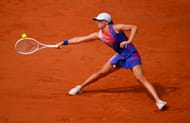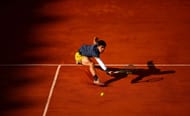How many ways can you win a tennis match? The purist's answer would be 'one,' the eclectic's answer would be 'dozens,' but the safest - and possibly realest - would be somewhere in between.
We've seen Serena Williams bludgeon players into submission with her pure power. We've seen Rafael Nadal push people so far out of their comfort zone they lose their legs. We've seen Novak Djokovic become a human wall and dare his opponents to beat him (which they never do). We've seen Roger Federer hoodwink everyone by making the ball carve out paths that didn't exist. The GOATs of our time have repeatedly shown us there is a very wide range of ways in which you can torture your opponent on a given day.
But is there more than one way to be dominant in tennis, particularly on a single surface? After nearly two decades of seeing Nadal create an empire in Paris with his patented mix of heavy topspin, lightning-quick footwork and unyielding patience, it didn't seem like the playbook for claycourt success would change any time soon. And yet the 2024 Roland Garros champions - Iga Swiatek and Carlos Alcaraz - are showing us you can do things very differently from the 22-time Slam champion and still look (for a short while at least, in Alcaraz's case) invincible on the dirt.
Two years ago I wrote about how Swiatek had used her idolization of Nadal to achieve greatness on the very turf he called his own. But while her mind continues to channel Nadal's relentlessness on the clay, her game has taken on a life of its own.
Swiatek certainly does all the basics right, which is a prerequisite for claycourt success. She slides on dirt like it's a skating rink, she mixes up spins with aplomb, and her backhand might have the most repeatable technique I've ever seen on the shot. But we say all of this in hindsight, after watching hours of highlights and replays. It is only when you watch her in real time that you see what the X-factor about Swiatek's game is: the fact that she doesn't give anyone any time to even process what she's doing right.
Swiatek doesn't just play with an intensity that borders on the insane; she is the very personification of intensity.
"She was playing unbelievable level I think all the match. No mistakes, hitting winners," Jasmine Paolini said after losing to the Pole in the final. "I mean, I tried to play my best, but it's not easy I think also to play at that intensity. I never played a player that has this intensity before in my life."
Swiatek doesn't give you time to breathe, let alone time your shots well. Her 6-0, 6-0 demolition of Anastasia Potapova in the fourth round took all of 40 minutes, and her win over Marketa Vondrousova (the reigning Wimbledon champion) in the quarters took just a few minutes more. While Nadal ground his opponents into the dust by slowing things down, Swiatek does the exact opposite.
The Pole is also showing a tendency to be quick at making history. With four French Open crowns in her bag, Swiatek has practically bolted into the pantheon of the greatest claycourters ever - and she's still just 23 years old.
Sometimes the frenetic pace at which she goes about her tennis can backfire, as it almost did against Naomi Osaka in the second round. Swiatek was outmatched by Osaka in the power department but she didn't seem to realize that. For about an hour and a half it looked like the Pole, in her bid to keep trying to sprint past Osaka, would trip over herself and fall.
But the thing about playing at a certain pace all the time is that it forces the opponent into changing their own style of play.
Osaka could match Swiatek's tempo, until she couldn't. Serving for the match in the decider, with Swiatek continuing to hit and move at warp speed, Osaka ended up rushing her shots and got broken. That was the last time Swiatek looked in any serious danger of relinquishing her crown.
"I'll always try my best no matter what the score is," Swiatek said after beating Paolini in the final. "Sometimes it's going to add up like that; sometimes I'm gonna lose. But when you're trying your best, it's always the best solution, because you have no regrets, and you can turn tournaments into something like that (pointing towards trophy)."

It's funny that while Swiatek talked about "giving your best" no matter what the situation, her fellow Roland Garros champion had a very different take on how to avoid regrets on the court.
"I'm trying on that moment just to be aggressive, just to go for it, play my style, go to the net, dropshots, hitting big shots," Alcaraz said after beating Alexander Zverev in five sets on Sunday. "Because if I lose it, if I miss it, my feelings are really good. It doesn't matter if I lose, it doesn't matter if I miss it, because when I go for it, the feelings are much better if I go defensive and lose it anyway."
Alcaraz's defense is probably his strongest suit; his ability to steal points by making opponents play an extra shot has already made for reams of highlights reels. But the man himself says he wouldn't be satisfied if he stuck to doing what he does best; instead, his biggest goal is to not be defensive.
He accomplished that goal for much of the first three sets against Zverev in the final, and it almost gave him a comfortable lead. Alcaraz was his usual belligerent self in the first couple of hours of the match, doing whatever he felt like with the ball and putting his opponent on a string. Despite the fact that he suffered a blip and Zverev served him off the court in the second set, neither of those things seemed likely to continue for long. There was always the feeling that Alcaraz's variety and courageous shot-making would win out in the end.
But Alcaraz is not just courageous with his tennis; he is almost reckless at times. Taking to the stage with an irreverence that has never been seen before, the Spaniard has made a habit of subverting traditional patterns of play and going for the most unthinkable shot in the most unlikely of circumstances.
The beauty - or tragedy, depending on your perspective - of tennis is that it takes just a minute of madness to undo hours of good work. While serving for the third set at 5-3 Alcaraz made one adventurous play too many, and got broken back.
That was all the invitation Zverev needed. In what seemed like the blink of an eye, he proceeded to win three games in a row and get within one set of his first Slam title.
There has been a lot of talk about Zverev's domestic abuse trial this French Open, a trial that was eventually settled out of court with no clear indication of whether he was guilty or not. Zverev took the settlement as a means to proclaim his innocence, and one tennis journalist subsequently went so far as to call Roland Garros 2024 the German's "Vindication Slam."
Zverev certainly had his chance to finally bag the elusive Major title and join the truly elite tier of the sport. The jury is out on whether that would've been 'vindication' of any sort, but it would unquestionably have etched his name in the history books.
History has to wait for Zverev though, for the simple reason that Alcaraz decided it would have to. Faced with the very real prospect of letting an eminently winnable match out of his hands, the Spaniard put his head down and started playing with more discipline. He kept the ball in play longer, added more air to his shots (even moonballing on a few occasions), and used his foot speed to eke errors out of Zverev's racket.
The showmanship still made a few appearances - there was an impossible drop shot winner after being stretched way wide, and a couple of stunning volleys off nothing approaches - but for the most part he was in control. When Alcaraz combines the spectacular with the steady the way he did in the last two sets of Sunday's final, it is hard to imagine anyone beating him on clay.
It has taken him some time to get to this point, but can it finally be said that Alcaraz is ready to establish his own empire on the dirt?

Clay was widely predicted to be Alcaraz's most successful surface when he first burst on to the scene as a 16-year-old. It helped that his first match win and first title both came on clay, and that he happened to hail from a country that has produced the greatest claycourter ever. But it was also about his game; the viciously dipping groundstrokes, the belief-defying movement, the spectacular gets - they all screamed future King of Clay.
He is the king in 2024 alright, having withstood two of the world's best players in successive four-hour matches. Of course, it is too early to say whether the Spaniard will actually go on to dominate the surface. The last time we expected him to start his own era, when he beat Djokovic to win Wimbledon, Alcaraz failed to reach another final for eight months.
But the way in which he won his last three matches in Paris this year suggests we are unlikely to witness a serious dip from the 21-year-old on clay.
In the quarterfinals Alcaraz made arguably the second-best claycourter of his generation, Stefanos Tsitsipas, look woefully out of his depth. At the semifinal stage he took everything that World No. 1 Jannik Sinner threw at him, and returned it with interest. And in the summit clash he gave Zverev hope, seemingly out of sheer boredom, before getting back to basics and finishing the job.
There are many ways to win a tennis match, and over the last one week Alcaraz showed us at least three different ones. We always knew there was nothing the Spaniard couldn't do on the court; now we know there's nothing he won't do on his way to winning Slam titles.
At this year's French Open, Iga Swiatek showed us how she intends to continue her claycourt dominance - by continuing to play faster than everybody else. And Carlos Alcaraz, although nowhere near the Pole in claycourt credentials yet, showed us what his potential claycourt dominance could look like - an era with a bit of consistency, a bit of showmanship, and a whole lot of irreverence.
